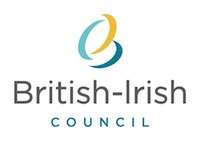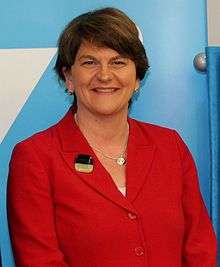British–Irish Council
 | |
| Abbreviation | BIC |
|---|---|
| Formation | 2 December 1999 |
| Type | Intergovernmental organisation |
| Legal status | British-Irish Agreement |
| Headquarters | Edinburgh, Scotland1 |
| Coordinates | 55°56′45″N 3°13′21″W / 55.94584°N 3.22262°W |
Region served | British Isles2 |
Membership |
|
| Website |
britishirishcouncil |
|
1 This is the location of the Standing Secretariat of the British-Irish Council. 2 Owing to a dispute over name of the archipelago, the BIC uses a number of euphemisms to avoid this term in its documents. | |
The British–Irish Council (BIC) is an intergovernmental organisation which aims to improve collaboration between its members in a number of areas including transport, the environment, and energy.[1] Its membership comprises Ireland, the United Kingdom, the UK's devolved administrations for Northern Ireland, Scotland and Wales, and the governments of the Crown dependencies of the UK: Guernsey, Jersey and the Isle of Man. England does not have a devolved administration, and as a result is not individually representated on the Council.[2]
The British and Irish governments, and political parties in Northern Ireland, agreed to form a Council in 1998 under the Good Friday Agreement. The Council was formally established on 2 December 1999 with the signing of an international agreement between the British Government and Irish Government—the British–Irish Agreement. Its stated aim is to "promote the harmonious and mutually beneficial development of the totality of relationships among the peoples of these islands". The BIC has a standing secretariat, located in Edinburgh, Scotland, and meets in semi-annual summit session and more frequent ministerial meetings.[3]
Membership and operation
Membership of the Council consists of the following administrations (with current heads of administrations as of December 2016):
| Member Administration | Representative(s) | Title | ||
|---|---|---|---|---|
| Guernsey | Deputy Gavin St Pier | Chief Minister | ||
| Isle of Man | Howard Quayle, MHK | Chief Minister | ||
| Ireland |  |
Enda Kenny, TD | Taoiseach | |
| Jersey | |
Senator Ian Gorst | Chief Minister | |
| Northern Ireland[4] |  |
Arlene Foster, MLA | First Minister | |
.jpg) |
Martin McGuinness, MLA | deputy First Minister | ||
| Scotland |  |
Nicola Sturgeon, MSP | First Minister | |
| United Kingdom |  |
Theresa May, MP | Prime Minister | |
| Wales | .jpg) |
Carwyn Jones, AM | First Minister | |
The nine heads of government meet at summits twice per year. Additionally, there are regular meetings that deal with specific sectors and are attended by the corresponding ministers. Representatives of members operate in accordance with whatever procedures for democratic authority and accountability are in force in their respective elected legislatures.
The work of the Council is financed by members through mutual agreement as required.[5] At the ninth meeting of the Council, it was decided that with devolved government returned to Northern Ireland that an opportune time existed "to undertake a strategic review of the Council's work programmes, working methods and support arrangements." This decision included the potential for a permanent standing secretariat, which was established in Edinburgh, Scotland, on 4 January 2012.
At its June 2010 summit, the Council decided to move forward on recommendations to enhance the relationship between it and the British-Irish Parliamentary Assembly (BIPA). The British-Irish Parliamentary Assembly is made up of members from the parliaments and assemblies of the same states and regions as the members of the British–Irish Council. The Council tasked its secretariat with moving this work forward in conjunction with the BIPA's secretariat.
In addition to the above members Cornwall has been a full observer member since 2010 due to the Cornish language falling under the Council's areas of work.[6]
Work areas
The Council agrees to specific work areas for which individual members take responsibility. The Belfast Agreement suggested transport links, agriculture, environmental issues, culture, health, education and approaches to the European Union as suitable topics for early discussion. However, these work areas can be expanded or reduced as the Council decides. It is also open to the Council to make agreement on common policies. These agreements are made through consensus, although individual members may opt not to participate in implementing any of these.
The current list of work areas and the member responsible are:
|
|
Demography was adopted as a work area at the 2006 meeting of the Council. It was proposed by the Scottish Executive, who also took responsibility for it. During the 2007 meeting of the Council the Scottish Government further proposed that energy become a work area of the Council. Past work sector areas included knowledge economy, e-health / telemedicine and tourism.
Name of the Council
Initial suggestions for the council included the names Council of the British Isles[7] or Council of the Isles,[8] and the council has sometimes been known by the latter name. However, owing to sensibilities around the term British Isles, particularly in Ireland, the name British-Irish Council was agreed.
The official name of the Council is represented in minority and lesser-used languages of the council as:
|
|
Summits
| Date | Host | Host leader(s) | Location held | ||
|---|---|---|---|---|---|
| 1st | 17 December 1999 | | Tony Blair | London | |
| 2nd | 30 November 2001 | | Bertie Ahern | Dublin | |
| 3rd | 14 June 2002 | | Pierre Horsfall | Saint Helier | |
| 4th | 22 November 2002 | | Jack McConnell | New Lanark | |
| 5th | 28 November 2003 | | Rhodri Morgan | St Fagans National History Museum, Cardiff | |
| 6th | 28 November 2004 | | Laurie Morgan | Castle Cornet | |
| 7th | 20 May 2005 | | Donald Gelling | Villa Marina, Douglas | |
| 8th | 2 June 2006 | John Prescott | ExCeL Conference Centre, London | ||
| 9th | 16 July 2007 | Northern Ireland | Ian Paisley Martin McGuinness | Parliament Buildings, Belfast | |
| 10th | 14 February 2008 | | Bertie Ahern | Royal Hospital Kilmainham, Dublin | |
| 11th | 26 September 2008 | | Alex Salmond | Hopetoun House, South Queensferry | |
| 12th | 20 February 2009 | | Rhodri Morgan | SWALEC Stadium, Cardiff | |
| 13th | 13 November 2009 | | Terry Le Sueur | Radisson Hotel, Saint Helier | |
| 14th | 25 June 2010 | | Lyndon Trott | Fermain Valley Hotel, Saint Peter Port | |
| 15th | 13 December 2010 | | Tony Brown | Sefton Hotel, Douglas | |
| 16th | 20 June 2011 | | Nick Clegg | Lancaster House, London | |
| 17th | 13 January 2012 | | Enda Kenny | Dublin Castle, Dublin | |
| 18th | 22 June 2012 | | Alex Salmond | Stirling Castle, Stirling | |
| 19th | 26 November 2012 | | Carwyn Jones | Cardiff Castle, Cardiff | |
| 20th | 21 June 2013 | Northern Ireland | Peter Robinson Martin McGuinness | Magee College, Derry~Londonderry | |
| 21st | 15 November 2013 | | Ian Gorst | L’Horizon Hotel, Saint Brélade | |
| 22nd | 13 June 2014 | | Jonathan Le Tocq | St. Pierre Park Hotel, Saint Peter Port | |
| 23rd | 28 November 2014 | | Allan Bell | Villa Marina Complex, Douglas | |
| 24th | 19 June 2015 | | Enda Kenny | Dublin Castle, Dublin | |
| 25th | 27 November 2015 | | Theresa Villiers | Lancaster House, London | |
| 26th | 17 June 2016 | | Nicola Sturgeon | Crowne Plaza Hotel, Glasgow | |
| 27th Extraordinary | 22 July 2016 | | Carwyn Jones | Cathays Park, Cardiff | |
| 28th | 25 November 2016 | | Carwyn Jones | Cathays Park, Cardiff |
See also
- Council of Ireland
- North/South Ministerial Council
- British-Irish Intergovernmental Conference
- British–Irish Parliamentary Assembly
References
- ↑ Jesse, Neal G., Williams, Kristen P.: Identity and institutions: conflict reduction in divided societies.Publisher SUNY Press, 2005, page 107. ISBN 0-7914-6451-2
- ↑ See Vernon Bogdanor, 'The British–Irish Council and Devolution', in Government and Opposition: An International Journal of Comparative Politics, volume 34, issue 3, July 1999, pp.291–295.
- ↑ "Scottish government website"
- ↑ The First Minister and deputy First Minister of Northern Ireland is a diarchy. While other members of the organization are represented at Summit Meetings by their respective chief ministers, or on occasions have sent their deputies, Northern Ireland is represented by both the First Minister and deputy First Minister of Northern Ireland. The Scottish and Welsh Deputy First Minister's have attended meetings in the past.
- ↑ Belfast Agreement – Strand Three, Articles 8 and 9.
British-Irish Council website, Frequently Asked Questions: Who pays for the British-Irish Council? Archived 30 June 2007 at the Wayback Machine. - ↑ Read, David (2014). Cornish National Minority Advisory Report. Truro: Cornwall Council. p. 22.
- ↑ UDP proposes creation of British Isles council, Irish Times, May 30, 1996
- ↑ The British-Irish Council: Nordic Lessons for the Council of the Isles, Mads Qvortrup and Robert Hazell, The Constitution Unit, October 1998
- ↑ 1/1999: AN tACHT UM CHOMHAONTÚ NA BREATAINE-NA hÉIREANN, 1999
- ↑ "Menystrans hembronk rag yethow teythyek, minoryta ha le-usys yw an Governans Kembrek". British-Irish Council. Retrieved 22 July 2014.